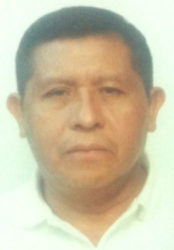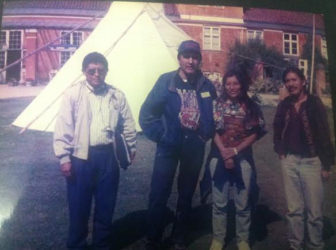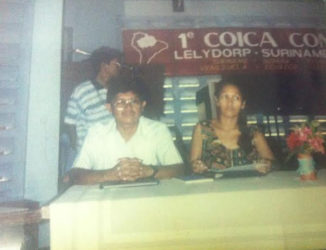Although thrilled that his commitment to preserving the rights of the indigenous peoples and his research in the Arecuna language have been recognised, national awardee Lawrence Anselmo says more needs to be done to protect the language or it could be lost.
“If nothing is done to protect it, I am afraid we will lose it among the younger ones. They don’t understand the importance of it now. Among those of my age group, there is a lot of concern that we need to preserve the language. Our language was not a written language… but it is time that it is… done in written form. Those of us who went to school and can write with this modern technology, we can be able to record it properly before it is lost,” Anselmo told Stabroek News in a recent interview.
Anselmo, a former Toshao of Paruima Village, in the Upper Mazaruni, Region Seven, which is said to be the only Arecuna-speaking community in Guyana, was last month bestowed the Golden Arrow of Achievement (AA) for his “unflinching commitment in the safeguarding of the rights of the indigenous peoples of Guyana and his research in the Arecuna language.”
Anselmo, 63, was born in Paruima.

He would later journey to the capital, Georgetown, to attend school. “I went to the Georgetown Seventh Days Academy,” he recounted. “I went back home when I was finished with school and my first appointment was acting school teacher at the Paruima Primary School. During that time, it was church school and I acted there for about five years,” he added.
In the 1980s, Anselmo was appointed Regional Vice-Chairman and he was later elected as village captain (Toshao), which was a post he held for more than two decades. During that time, he used his position to strongly advocate for the indigenous peoples in Guyana. And while he is no longer functioning in that capacity, he still aims to give back to his community.
“My number one work is to give back to my community and assist the younger ones coming up. Try to write up a report, a profile of the village, stories and songs,” he told this newspaper.
He said he has been unable to do anything recently due to ill health but he hoped to resume his work once he has recovered. “I am focusing on helping the community to write a community profile so that I can share my wealth of experience. The young ones are doing the project but my contribution will help the young ones… This is important because as a community you need to have a written history somewhere. It was not done by former elders. We only have what we call world information,” he explained.

Speaking on the preservation of the Arecuna language, Anselmo said that while the language is still being spoken in his community and is taught at the schools there, it needs to be properly protected. In 2014, the Inter-American Development Bank, through a US$5,000 grant, partnered with the village to preserve the cultural heritage and values of the native language. The project aimed at supporting the preservation of the native Arecuna language by transferring it to children between the ages of four and eleven years since the village believed that the language is a critical part of its cultural identity and heritage.
To this end, Anselmo said that while he is happy that it is being taught in the community, “I would love for them to start teach it out here. That is part of our identity as indigenous people of different groups. I feel that each group should maintain their language whether it is Arawak or Carib etc,” he said.
“The introductory work that I did at the University of Guyana, I think it is being used in that school for guidance. But of course that is not the first and the last. We need to improve on that,” he said.
The AA, which is the fourth highest award in the Order of Service in Guyana, is awarded to any citizen who has performed an outstanding and specific act of service or achievement of an exceptional nature or has given long and dedicated service of a consistently high standard in in any area of public service. Anselmo is quick to point out that he did not earn the award by himself. “I didn’t do it on my own. I owe it to my people. [I] owe it to the exposure I got from the government; they did not restrict me. They said, ‘Hey, you have been identified to go on this trip, you know what to say and do.’ I was afforded great exposure and that built my interest to do more for my people,” he noted.
“I was actually determined to do more for my people in terms of representing the issues affecting my people to the relevant body,” he further stated.

Anselmo also credited his exposure to various international forums, while noting that he was able to “meet with different people around the world, hear their stories, learn from those experiences and apply that in my country and educate my people.”
He added, “When I reflect on the work that I did, it is not one person… I was exposed to international forum by the then PNC government. I actually represented Guyana at the United Nations and I also addressed the United Nations. I also attended workshops in Europe, Central America as well as the Amazon countries.”
According to Anselmo, the number one issue affecting the indigenous people in Guyana continues to be land rights and he said that these need to be settled since they gravely affect the communities. “Land is connected to everything. Once you have land and it is not settled, you have mining issues, forestry issues. We need to settle issues surrounding land. On land, everything takes place. I feel that once those issues are settled, it is going to have the kind of impact, minimising the effect that has been affecting the communities,” he stated.
And while he believes the concerns of the indigenous were not properly addressed under the previous administration, Anselmo is optimistic that the present one will do better. “It has only been a year but so far our initial response to the new government is that they have been responsive and they have assured us that they will look into some of the burning issues that affect the communities in the Upper Mazaruni,” he said.





